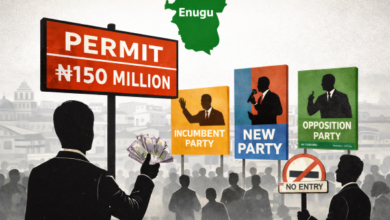Hardship: Abuja residents worried over new minimum wage delay
 Some residents of Abuja have expressed concern over the delay in announcing a new minimum wage, calling for a speedy increase in the minimum wage to help Nigerians cope with the current economic difficulties.
Some residents of Abuja have expressed concern over the delay in announcing a new minimum wage, calling for a speedy increase in the minimum wage to help Nigerians cope with the current economic difficulties.
They specifically urged the committee handling the process to double their efforts to cushion the effects of government economic policies on Nigeria.
The residents spoke in separate interviews with the News Agency of Nigeria (NAN) on Saturday in Abuja.
BRANDPOWER reports that upon assuming office in 2023, President Bola Tinubu removed fuel subsidy, leaving the cost of PMS to the forces of demand and supply.
The measure has led to a hike in the prices of petroleum products and an increase in the cost of transportation, food items and other services.
A recent National Bureau of Statistics (NBS) Consumer Price Index has indicated rising inflation rates that hit 31.70 per cent in February 2024, up from 29.90 per cent recorded in January.
The developments are with no corresponding rise in workers’ income.
Analysts have, thus, advised the tripartite committee inaugurated on Jan. 30 to review the current minimum wage of N30,000, to ensure that the new wage reflects current economic realities and the evolving economic hardship.
Ms Ladu Tarfa, a public servant residing in Kado, said that workers’ incomes should be reviewed upwards to encourage productivity.
Tarfa said that many families were struggling to meet basic necessities of life because their income could no longer cover them as prices of food, education and transportation had skyrocketed.
A civil servant residing in Lugbe, Miss Gwamkat Gwamzhi, appealed to the government to have mercy on ordinary Nigerians as the increase in the prices of essential goods was exacerbating hardship in the country.
“Gas is within N1,250 to N1300 per kg; Petrol is between N617 to N700 per litre, depending on location. With a N30,000 minimum wage, it is difficult to cope.”
Mrs Ruth Isa, a business woman resident in Kubwa, said that the state of the economy required government to urgently increase the minimum wage and create more opportunities for its citizens to facilitate ease of doing business.
Similarly, a cleric, Rev. Samuel Gorro, has urged the government to formulate pro-poor policies and avoid causing additional difficulties for poor Nigerians through their policies.
Gorro, the Executive Director of the Centre for the Advancement of Peace in Nigeria, criticised the rising cost of services without an increase in minimum wage.
BRANDPOWER reports that the Nigerian Electricity Regulatory Commission recently approved a 300 per cent increase in electricity tariff, effective April 1, for urban consumers known as Band A consumers.
A civil servant, Miss Sarah Isa, said that the Nigeria Labour Congress (NLC) should insist on a substantial wage increase that would benefit workers at all levels.












